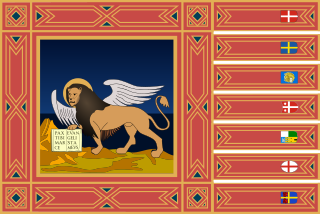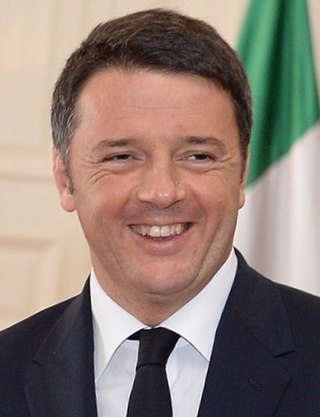
Euroscepticism, also spelled as Euroskepticism or EU-scepticism, is a political position involving criticism of the European Union (EU) and European integration. It ranges from those who oppose some EU institutions and policies and seek reform, to those who oppose EU membership and see the EU as unreformable. The opposite of Euroscepticism is known as pro-Europeanism.

Lega Nord, whose complete name is Lega Nord per l'Indipendenza della Padania, is a right-wing, federalist, populist and conservative political party in Italy. In the run-up of the 2018 general election, the party was rebranded as Lega, without changing its official name. The party was nonetheless frequently referred to only as "Lega" even before the rebranding, and informally as the Carroccio. The party's latest elected leader was Matteo Salvini.

Forza Italia was a centre-right liberal-conservative political party in Italy, with Christian democratic, liberal, social democratic and populist tendencies. It was founded by Silvio Berlusconi, who served as Prime Minister of Italy four times.
Liberal conservatism is a political ideology combining conservative policies with liberal stances, especially on economic issues but also on social and ethical matters, representing a brand of political conservatism strongly influenced by liberalism.

The Italian Republican Party is a political party in Italy established in 1895, which makes it the oldest political party still active in the country. The PRI identifies with 19th-century classical radicalism, as well as Mazzinianism, and its modern incarnation is associated with liberalism, social liberalism, and centrism. The PRI has old roots and a long history that began with a left-wing position, being the heir of the Historical Far Left and claiming descent from the political thought of Giuseppe Mazzini and Giuseppe Garibaldi. With the rise of the Italian Communist Party and the Italian Socialist Party (PSI) to its left, it was associated with centre-left politics. The early PRI was also known for its anti-clerical, anti-monarchist, republican, and later anti-fascist stances. While maintaining those traits, during the second half of the 20th century the party moved towards the centre on the left–right political spectrum, becoming increasingly economically liberal.

Matteo Salvini is an Italian politician who has been serving as Deputy Prime Minister of Italy and Minister of Infrastructure and Transport since 2022. He has been Federal Secretary of Italy's Lega party since December 2013 and an Italian senator since March 2018. Salvini represented Northwestern Italy in the European Parliament from 2004 to 2018.

The Italian Socialist Party was a social democratic and democratic socialist political party in Italy, whose history stretched for longer than a century, making it one of the longest-living parties of the country. Founded in Genoa in 1892, the PSI was from the beginning a big tent of Italy's political left and socialism, ranging from the revolutionary socialism of Andrea Costa to the Marxist-inspired reformist socialism of Filippo Turati and the anarchism of Anna Kuliscioff. Under Turati's leadership, the party was a frequent ally of the Italian Republican Party and the Italian Radical Party at the parliamentary level, while lately entering in dialogue with the remnants of the Historical Left and the Liberal Union during Giovanni Giolitti's governments to ensure representation for the labour movement and the working class. In the 1900s and 1910s, the PSI achieved significant electoral success, becoming Italy's first party in 1919 and during the country's Biennio Rosso in 1921, when it was victim of violent paramilitary activities from the far right, and was not able to move the country in the revolutionary direction it wanted.

Religion in Italy has been historically characterised by the dominance of the Catholic Church, the largest branch of Christianity, since the East–West Schism. This is in part due to the importance of Rome in the history of the Church, including its historical status as a leading patriarchate and the presence of the Vatican, the Catholic Church's headquarters and the residence of the Pope—the Bishop of Rome—within its borders. However, due to immigration, notably the influx of Muslims, Eastern Orthodox Christians, Protestants, Buddhists and Hindus, as well as proselytism and secularization, religious pluralism in Italy has increased in the 21st century. Italy also features a pre-Christian Jewish community, an autochthonous Protestant church–the Waldensian Evangelical Church and one of the largest shares of Jehovah's Witnesses in the world.

Right-wing populism, also called national populism and right populism, is a political ideology that combines right-wing politics with populist rhetoric and themes. Its rhetoric employs anti-elitist sentiments, opposition to the Establishment, and speaking to or for the common people. Recurring themes of right-wing populists include neo-nationalism, social conservatism, economic nationalism, and fiscal conservatism. Frequently, they aim to defend a national culture, identity, and economy against perceived attacks by outsiders. Right-wing populism has associations with authoritarianism, while some far-right populists draw comparisons to fascism.

The Democratic Party is a social democratic political party in Italy. The party's secretary is Elly Schlein, elected in the 2023 leadership election, while the party's president is Stefano Bonaccini.

This page gathers the results of elections in Veneto.
Immigration to Europe has a long history, but increased substantially after World War II. Western European countries, especially, saw high growth in immigration post 1945, and many European nations today have sizeable immigrant populations, both of European and non-European origin. In contemporary globalization, migrations to Europe have accelerated in speed and scale. Over the last decades, there has been an increase in negative attitudes towards immigration, and many studies have emphasized marked differences in the strength of anti-immigrant attitudes among European countries.

The Italian Social Movement was a neo-fascist political party in Italy. A far-right party, it presented itself until the 1990s as the defender of Italian fascism's legacy, and later moved towards national conservatism. In 1972, the Italian Democratic Party of Monarchist Unity was merged into the MSI and the party's official name was changed to Italian Social Movement – National Right.

The 2014 European Parliament election in Italy took place on 25 May 2014. Italy elected 73 MEPs out of 751 European Parliament seats.

Eurocommunism was a trend in the 1970s and 1980s within various Western European communist parties, which said they had developed a theory and practice of social transformation more relevant for Western Europe. During the Cold War, they sought to reject the influence of the Soviet Union and its communist party. The trend was especially prominent in Italy, Spain, and France. It is commonly considered to have been prompted by the Prague Spring. Although the various parties converged against the Soviet factor, their own doctrines remained as different at the dissolution of the movement as they originally were before 1968.
The European Parliament election of 2019 took place in Italy on 26 May 2019.
The European Parliament election of 2019 took place in Italy on 26 May 2019.
The 2019 European Parliament election took place in Italy on 26 May 2019.
The European Parliament election of 2019 took place in Italy on 26 May 2019.
The European Parliament election of 2019 took place in Italy on 26 May 2019.












